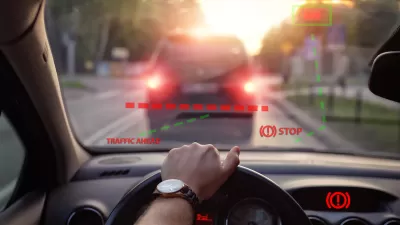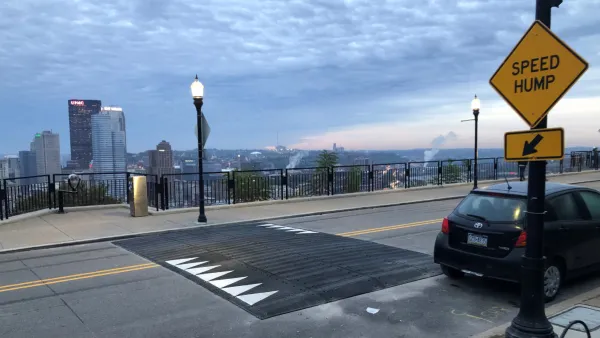The automatic braking systems on two major car models failed to stop for pedestrians wearing reflective strips in a test.

New research from the Insurance Institute for Highway Safety indicates that automatic braking systems on Honda and Mazda cars fail to recognize pedestrians wearing reflective clothing, reports Gersh Kuntzman for Streetsblog USA.
“In the study, researchers outfitted an adult-sized dummy black clothing, one in white clothing, one with a reflective jacket and one with a reflective strips in a configuration similar to those worn by roadway workers (though their safety gear is generally bright orange or yellow rather than black).” In test conditions with various types of lighting, Honda and Mazda vehicles hit crash test dummies wearing reflective strips, and the Honda car hit the dummy wearing a reflective jacket. A Subaru Forester model stopped for most of the dummies in the test.
The study shows that wearing reflective clothing — often the only safety advice given to pedestrians — won’t always protect people walking. According to researcher David Kidd, “People are able to perceive what's out on the roadway and make quick decisions when things get confusing or are uncertain. And these technologies are not as adept at doing those type of things as we are.”
FULL STORY: Alarming Report Shows that Two Auto-Braking Systems Can’t See People in Reflective Garb

Montreal Mall to Become 6,000 Housing Units
Place Versailles will be transformed into a mixed-use complex over the next 25 years.

Planetizen Federal Action Tracker
A weekly monitor of how Trump’s orders and actions are impacting planners and planning in America.

DARTSpace Platform Streamlines Dallas TOD Application Process
The Dallas transit agency hopes a shorter permitting timeline will boost transit-oriented development around rail stations.

Without International Immigrants, the Rural US Population Would Be Falling 58%
Census data shows that population growth in rural areas is due in large part to international migrants.

Dead End: Nine Highways Ready for Retirement
The Freeways Without Futures report describes the nation’s most promising highway removal proposals.

Congressman Proposes Bill to Rename DC Metro “Trump Train”
The Make Autorail Great Again Act would withhold federal funding to the system until the Washington Metropolitan Area Transit Authority (WMATA), rebrands as the Washington Metropolitan Authority for Greater Access (WMAGA).
Urban Design for Planners 1: Software Tools
This six-course series explores essential urban design concepts using open source software and equips planners with the tools they need to participate fully in the urban design process.
Planning for Universal Design
Learn the tools for implementing Universal Design in planning regulations.
City of Mt Shasta
City of Camden Redevelopment Agency
City of Astoria
Transportation Research & Education Center (TREC) at Portland State University
City of Camden Redevelopment Agency
Municipality of Princeton (NJ)
Regional Transportation Commission of Southern Nevada





























